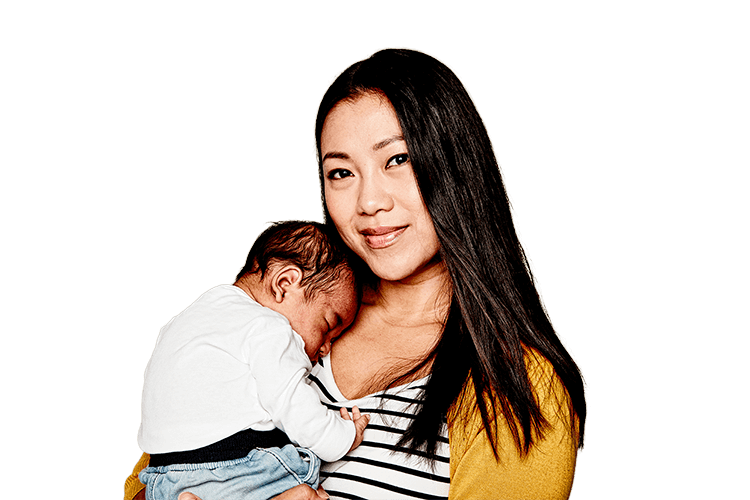Pregnancy is a wonderful and exciting time in your life. But it also comes with a lot of aches and pains. From headaches to lower back pain, pelvic pain and cramping, it’s all a normal part of the journey. But that doesn’t mean you can’t do anything to relieve it!
Obstetrician Dr Danielle Wilkins answered our questions about dealing with pain during pregnancy.

Can I do anything about pregnancy aches and pain?
Let’s start at the top and move down:
Headaches: During the first half of the pregnancy it is not uncommon to have mild but persistent headaches. These are more common towards the end of the day. These headaches are due to a combination of dehydration, fatigue and the pregnancy hormones, all in varying amounts. Clearly, your body is asking for more rest and more fluids.
Tender breasts: The hormonal effects on the breasts feel similar to puberty - your breasts will be very tender and your nipples may be extremely sensitive. Ensure you have a comfortable bra, and if you are trying to exercise, consider wearing a sports bra as well as a crop top for extra support. Nipples can benefit from some extra barriers - nipple cream plus breast pads may come in handy much earlier than you expected. Your growing breasts may create some back pain between your shoulders, make sure that your bra is properly fitted and that your posture is as good as it can be.
Stitch-like pain and aching muscles: As the baby and uterus grow everything else has to stretch and move out of the way. The growing uterus pulls on the round ligaments which creates an intermittent but intense stitch like pain in the lower abdomen and down into the groin. The stretching abdominal muscles can burn and feel like muscles that have been overworked at the gym. The ribs where these muscles attach may start to ache as well.
Lower back pain: With the central weight gain associated with a growing baby it is common to get lower back pain. It is really important to care for your lower back by adopting good posture, and lifting with your legs muscles instead of your back muscles.
Discomfort through the hips and pelvis: A hormone called relaxin works around joints to allow for increased mobility, a design feature that is important during child birth but less popular for the other nine months of the pregnancy. This discomfort you experience through your hips and pubic bone is most likely exacerbated by this helpful little hormone. Support your pelvis by trying to keep your knees together as much as possible - when getting in and out of the car, rolling over in bed and by avoiding using too many stairs.
Leg cramps: In the second half of the pregnancy it is common to get leg cramps, especially in your lower legs. Sometimes these are associated with low iron levels, and can also be improved by taking calcium and magnesium supplements.
Swelling: The mild swelling in feet and hands toward the end of pregnancy can also become quite distressing. In the mornings you may have numb, tingling or aching fingers due to the swelling pushing on a nerve in your wrist. Sleeping with wrist splints is a necessity for some. You should wear flat supportive shoes to reduce the aching in the balls of your feet.
Which painkillers are safe to use during pregnancy?
Paracetamol is considered safe to take as needed to manage pain in pregnancy. If your discomfort is not reduced following a normal dose of 1000mg discuss your pain with your health care provider.
What natural remedies can you use to ease aches and pains during pregnancy?
It is safe to use massage, muscle relaxing creams and hot or cold packs to relieve pain during pregnancy.
Can exercise help?
Gentle exercise is a very important part of pregnancy management. Muscles are much happier if they are working together and regularly. Individual assessment with a women’s health physiotherapist can help you to manage more specific issues, such as severe pelvic pain.
Are there any aches and pains that aren’t normal during pregnancy – when should I alert a doctor?
Our body is good at warning us that something is not right, so it is important to pay attention to those messages.
- Headaches: If headaches are persistent and don’t respond to rest or paracetamol, or if there are associated problems, like changes to your vision, you should contact your doctor.
- Persistent pain between your ribs: If it doesn’t settle with antacid medication, or is severe, see your doctor.
- Back pain: Sudden or severe back pain should also be checked on.
- Abdominal pain: If it is sudden, severe or unrelenting, it needs to be reported to your health care professional. If you are less than 37 weeks and having strong cramping pains you may have premature contractions and you should check in with your doctor or hospital.
- Persistent leg cramp: A leg cramp that doesn’t go away or is in a particularly swollen leg may also be abnormal and needs checking.
In summary - if it is sudden, severe or if there are other associated symptoms, get a check-up.
Need a little extra support?
Health Concierge
Eligible members with hospital cover can now talk to a member of our Health Concierge team for advice and guidance on how to have a healthy pregnancy, at no extra cost on 1800 789 414.#
Got a health question? 24/7 Medibank Nurse Support
Medibank health insurance members can chat to a registered nurse over the phone or online to discuss any health questions or concerns at no extra cost.~ Chat online or call 1800 644 325 24 hours a day, 7 days a week.
24/7 Medibank Mental Health Support
Medibank members with health insurance can talk with a mental health professional over the phone or online in relation to any mental health or emotional concern at no extra cost.~ Log in or call 1800 644 325, 24 hours a day 7 days a week.
Looking for something else?
Visit Medibank Planning, Pregnancy and Parenting for a range of tools and advice to help you at every stage of your pregnancy journey.
Help the way you want it
Contact us
Call us on 134 190 to speak to a consultant. Alternatively, chat to us 24/7 online.
Self-service options
Login to MyMedibank or Download the MyMedibank App for self service options.
Find a specialist
Find a specialist or Member's choice hospital using our find a provider tool.

Things you should know
~ Some referred services may involve out of pocket costs and waiting periods may apply.
# Health Concierge is available to all eligible Medibank members who hold hospital cover. Excludes Overseas Visitor Health Cover, Working Visa Health Cover and Overseas Student Health Cover (OSHC). Some referred services may involve out of pocket costs.
While we hope you find this information helpful, please note that it is general in nature. It is not health advice, and is not tailored to meet your individual health needs. You should always consult a trusted health professional before making decisions about your health care. While we have prepared the information carefully, we can’t guarantee that it is accurate, complete or up-to-date. And while we may mention goods or services provided by others, we aren’t specifically endorsing them and can’t accept responsibility for them. For these reasons we are unable to accept responsibility for any loss that may be sustained from acting on this information (subject to applicable consumer guarantees).